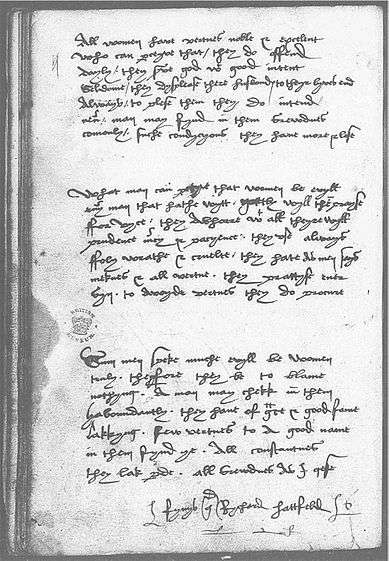|
Introduction | Contributors | Textual Introduction |
| ←The restfull place Revyver of my smarte | What no perde ye may be sure→ |
 The Devonshire Manuscript facsimile 18v |
f. [18v]
1 # All women have vertues noble & excelent
2 Who can per{p+}ceyve that / they do offend
3 {w+t+}[[The Devonshire Manuscript/Appendix_I:_Paleographic_Features|{{s}8}]] dayly / they serve god with good intent
4 Seldome / they dysplease there husbandes{es} to theyr lyves end
5 Always / to plese them they do intend /
6 shrewdness neuer{u'} / man may fynd in them srewdnes
7 comonly / suche condycyons they haue more & lese
8 What man can per{p+}cyve that women be evyll
9 {_e}{u'} euery man that hathe wytt . gretly wyll them prayse
10 ffor vyce : they Abhorre with{w+t+} all theyre wyll
11 prudence mer{m'}cy & pacyence ./.1 they vse always
12 ffoly wrathe & cruelte / they hate As men says
13 meknes meekness & all vertue . they prattyse euer
14 syn . to Avoyde vertues they do procure
15 Sum men speke muche evyll be women
16 truly . theyfore they be to blame
17 nothyng . A man may chekk in them
18 haboundantly . they haue of gra{gA}ce & good fame
19 Lakkyng . few vertues to A good name
20 in them fynd ye . All constantnes
21 shrewdness they lak per{p+}de . all srewdnes As I gese
fynys quod{q+d+} Richard Hattfield s
Notes & Glosses
1. This punctuation is "high dot--forward slash--low dot."
Commentary
Attributed to Richard Hattfield in the text, this poem was entered by H2. This poem's first stanza appears in the Arundel-Harington Manuscript and in Cambridge MS Pepys 2553 as an anonymous Scottish poem and in the manuscripts of the Marquis of Bath, including Longleat 258.[1] The version in the Devonshire Manuscript contains two additional stanzas that are unique to this manuscript.[2] Hattfield may have composed the additional stanzas. Depending on how one reads the punctuation and line breaks in this poem, the lyric can either describe the virtue of women or their wickedness.
Works Cited
- ↑ In the Longeat 258 manuscript, the poem appears alongside John Lydgate and Chaucer's minor poems as well as other debates about women, including La Belle Dame sans Merci, The Assembly of Ladies, and The Heart and the Eye.
- ↑ Ruth Hughey, "The Harington Manuscript at Arundel Castle and related documents," Library 4th ser. 15 (1935): 209.